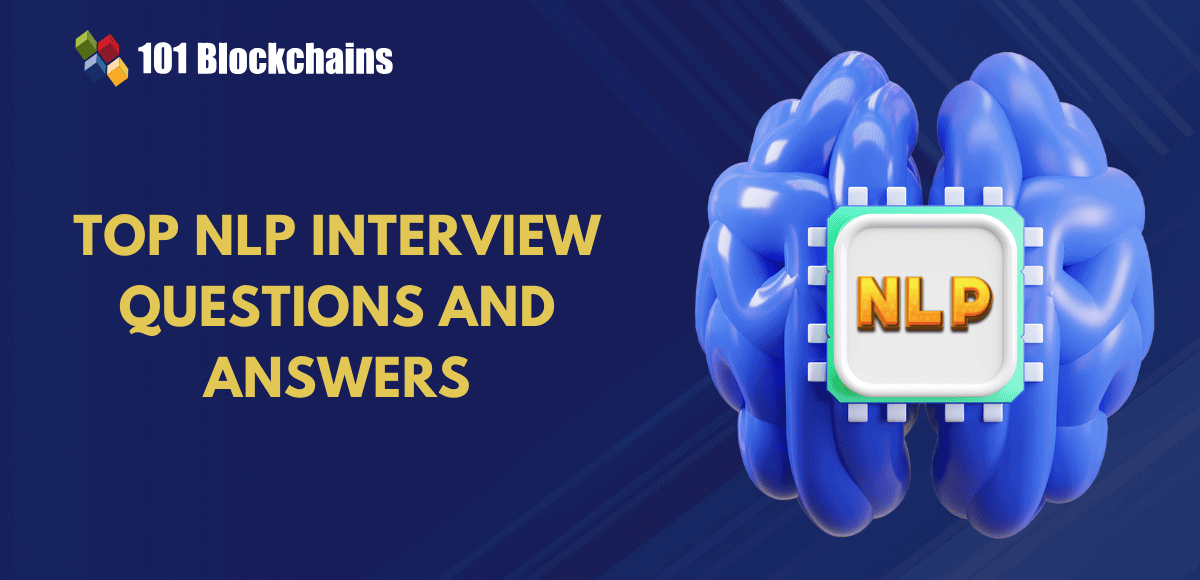Learn how blockchain truly works, master key definitions, and uncover what makes smart contracts so "smart." Dive into the fundamentals, gain valuable insights, and start your blockchain journey today!

- Interview Preparation
Georgia Weston
- on August 25, 2023
Top 20 Rust Interview Questions and Answers
The most common programming languages in the world of technology include Java, PHP, Python, and C++. You must have come across news about the growth of smart contract programming languages such as Solidity. Rust is one of the most popular alternatives to Solidity for smart contract development for its wide range of features. Therefore, the search for top-rust interview questions has intensified in recent times.
Mozilla developed the language in 2010 for creating applications that need high-end processing without the concerns of invalid memory access. Rust offers the promising advantages of better concurrency, speed, and safety. It also offers promising benefits for improving memory management and performance. It offers a perfect tool for creating advantaged applications such as browsers, gaming engines, and operating systems.
The demand for Rust developers is increasing in the web3 landscape, with the continuously growing need for scalability. The average annual salary for a Rust developer is almost $120,000. Therefore, preparations for the best Rust interview questions can help you build a promising career as a Rust programming expert. Awareness about the Rust developer interview questions can give you an additional edge in answering the questions in an interview with confidence. Let us find out the top interview questions on Rust programming language in different categories.
Curious to understand the complete smart contract development lifecycle? Enroll Now in Smart Contracts Development Course!
Fundamental Rust Interview Questions
The fundamental Rust interview questions are the first set of questions you can expect in an interview for Rust programming roles. Fundamental questions test the knowledge of candidates regarding the basic concepts in Rust. Here are the most popular Rust interview questions you should learn right now.
1. What is Rust?
Rust is a general-purpose programming language with the assurance of memory safety and higher performance. It can help in writing correct code, which can be maintained properly. Rust programming could also help in compiling programs suited to multiple patterns and architectures, such as web browsers.
2. Which type of application uses Rust?
The next addition among Rust interview questions for fundamental skills would point to the use cases of Rust. It is a general-purpose language that you can use for writing multiple types of programs throughout multiple domains. Rust helps you in creating command-line programs, text processors, web servers, databases, device drivers, operating systems, and many other applications.
The advantage of better performance with Rust programming language also makes it suitable for creating real-time applications, which require audio and video decoding. On top of it, the assurance of security in Rust makes it eligible for writing software where you need higher availability, such as cryptographic algorithm implementations or server software.
Build your identity as a certified blockchain expert with 101 Blockchains’ Blockchain Certifications designed to provide enhanced career prospects.
3. What are Cargo and Cargo.lock in Rust?
The outline of Rust programming MCQ questions would also draw attention toward the use of Cargo in Rust. Cargo is a development system and package manager developed for Rust users that enables direct management of projects from the language. Cargo helps in creating your code in Rust alongside downloading the libraries required for your code and creating the libraries according to your use case. Cargo.lock is the file created when a user implements the cargo build command. The command automatically generates the cargo.lock file for maintaining a tab on all dependencies associated with the user application.
4. What happens to borrowed data and owned data at the end of Rust function?
Candidates appearing for Rust programming jobs would also need answers to ‘Where to ask Rust questions?’ and ways for responding to simple technical questions. In the case of a function that could borrow data, the borrowed data can be available for utilization after the end of the function. The ownership of data is not transferred upon borrowing. On the other hand, writing functions that take ownership of data could imply that the data would be deleted at the end of the function.
Are you planning to become a certified professional with accredited certifications? It’s time to level up your career with 101 Blockchains CPD accredited certification programs.
5. How do you handle errors in Rust?
The error handling procedures in Rust are also another noticeable addition to the interview questions on Rust programming. You can find top Rust interview questions asking about error handling procedures in Rust. First of all, you would find a recoverable error in which the program does not stop completely. On the other hand, developers can interpret and respond to such errors with simplicity.
Another important step in error handling procedures in Rust points to unrecoverable errors. In the case of unrecoverable errors, the panic macro of Rust showcases the error message and cleans the error before quitting. Developers can also opt for writing code that showcases panic mode, and it would follow the recovery approach for unrecoverable errors.
6. What are the most notable features you can find in Rust?
The advantages of Rust programming language are one of the common themes you can come across in interview questions on Rust programming. However, you can also find the best Rust interview questions about the features of Rust, which provide programming advantages to users. Rust offers abstraction without any cost or compromising the quality, runtime performance, or clarity of code.
Rust also offers clear error messaging and changes in move semantics. One of the biggest advantages of Rust is evident in the feature of memory safety. Rust utilizes ownership for ensuring memory safety and variables’ own memory space. Users can also utilize Rust for memory safety at the time of compilation without depending on garbage collection.
Start your blockchain journey Now with the Enterprise Blockchains Fundamentals!
7. Does Rust have any limitations?
The list of fundamental Rust interview questions would also focus on the limitations associated with the programming language. For example, compilation could be slow in Rust programming and features a moderately complicated system. In addition, you must notice that the Rust compiler does not work with optimizations without requests to prevent a slowdown of compilation. Therefore, you are less likely to introduce optimizations in your code with Rust. Furthermore, Rust also utilizes LLVM for generating code.
8. Which libraries can help you with an asynchronous I/O operation in Rust?
You can explore different libraries which provide asynchronous input/output in Rust programming. Such types of entries in the most popular Rust interview questions would require answers with references to libraries that offer asynchronous input/output in Rust programming. The asynchronous I/O libraries in Rust include tokio, rotor, mio, mioco, coio-rs, and many others.
Start learning Blockchain with World’s first Blockchain Skill Paths with quality resources tailored by industry experts Now!
Intermediate Rust Interview Questions
After confirming your knowledge of Rust fundamentals, you would have to wonder about the next category of questions. The responses for ‘Where to ask Rust questions?’ might direct you towards the intermediate-level questions. Interviewers would want to know whether you have actually used Rust programming in any practical application. Here are some of the most noticeable intermediate-level questions in Rust programming interviews to test your readiness for Rust programming roles.
9. What are generics and traits of Rust?
The outline of Rust practice questions for interviews would also require you to learn about Rust’s traits and generics. Traits are an effective resource in Rust programming language for declaring the existence of specific behavior. It is also important to remember that the implementation of the behavior would be directly related to the data responsible for implementing the trait. You can think of it as the reliable approach for creating an interface, which would determine the next set of events, while the implementation determines the approach of the events.
Generics are another crucial element in the interview questions for Rust programming professionals. Rust generics offer a viable approach for creating functions, structures, and enums which are not aware of the type of data they would work on. The combination of generics ensures that traits could serve as generic constraints which can declare the type of data usable in the function.
10. What is the role of Rust question mark operator?
A question mark operator is a promising tool for convenient error handling and management of missing data. When you use the Rust question mark operator with Result command, it will unwrap an ‘Ok’ or return an error message. On the other hand, using the question mark operator with Option would lead to unwrapping a ‘Some’ or returning ‘None.’ The question mark operator returns values, thereby suggesting that the function signature should have ‘Option’ or ‘Result’ in the return type.
Want to know the best tips to navigate through the career path in blockchain easily? Check the detailed guide Now on Top 10 Tips To Start A Career In Blockchain
11. Do you know about Rust closures?
The review of intermediate-level Rust interview questions also draws attention to Rust closures. You can find three different types of closures in Rust, such as FnMut, Fn, and FnOnce. The Fn closures could be called multiple times, and they could work only on immutable data. On the other hand, FnMut closures can also be called multiple times, and they have the ability to mutate captured data. FnOnce closures can be called only one time and could happen when closure moves data out of the body.
12. What is the type of state pattern in Rust?
Type state pattern in Rust uses the type system for the definition of a state machine. A Rust struct represents the definition of every state in the state machine. At the same time, it ensures that the transitions have representation through function calls. The function calls could return the state structures which have been already defined and serve as the sole points for transitions.
Aspiring to make a lucrative career as a blockchain engineer but not sure how? Check the detailed guide Now on How To Become A Blockchain Engineer
13. What is the procedure for creating nested functions on Rust?
The method for creating nested functions is also one of the top additions among Rust programming MCQ questions you might come across in interviews. It follows the same procedure as creating non-nested functions. You can utilize the ‘fn’ keyword in an existing function for creating a nested function. Nested functions are useful in situations where you want to avoid repetition of certain pieces of code. In addition, nested function helps in encapsulating desired functionality without adding more modules.
14. Do you know anything about the importance of a HashMap in Rust programming?
HashMap is a crucial component of Rust programming as it serves as the collection featuring key/value pairs. Keys can help in locating elements in the HashMap. In addition, the values of a HashMap represent the data related to each key.
Aspiring to make a lucrative career as a blockchain developer but not sure how? Check the detailed guide Now on How To Become Blockchain Developer?
15. What is new type of pattern in Rust?
Rust programming has introduced a new type pattern that can take an existing type for wrapping in another developer-created type. The objective of the new type pattern focuses on implementation of traits on existing types. It also aims at offering relevant interfaces for the application.
Advanced Rust Interview Questions
The final phase of a Rust programming interview would include advanced Rust interview questions. You can use the following advanced Rust interview questions to prepare for your dream job in Rust programming.
16. Where do you use Arc in Rust programming?
Developers can use Arc in Rust when multiple threads in the code want accessibility to specific data.
Aspiring to make a lucrative career as a blockchain expert but not sure how? Check the detailed guide Now on How To Become A Blockchain Expert
17. What is a supertrait in Rust?
Supertrait is a combination of two or multiple traits in Rust. Upon establishing a supertrait as a trait, all the traits in it would demand implementations according to the type.
18. Do you know about the importance of cargo workspaces in Rust?
Cargo workspaces are also an interesting addition to the best Rust interview questions for aspiring programmers. They offer a solution for organizing different crates in one directory alongside allowing cargo to manage them.
Curious to learn about blockchain implementation and strategies? Enroll Now in Blockchain Technology – Implementation And Strategy Course!
19. Which is the ideal situation for using a Rust declarative macro?
Developers can use declarative macros in Rust programming when they have to create multiple code blocks, with each block having the same code. Declarative macros can also help in creating domain-specific languages.
20. Does the use of dynamic dispatch and trait objects affect Rust programming?
Yes, dynamic dispatch and trait objects result in overhead for Rust programming projects.
Start learning Blockchain with the world’s first Blockchain Expert Career Path and become a Blockchain Expert!
Conclusion
The review of interview questions and answers on Rust programming language serves as a promising tool for interpreting your performance and knowledge in Rust. You can use the top Rust interview questions to check your capabilities to work in the role of a Rust programming professional. Find out more about the potential of Rust and find trusted training resources to gain fluency in the programming language. Take the initiative to learn more about Rust programming and pursue a lucrative career in web3 as a Rust developer right now.





